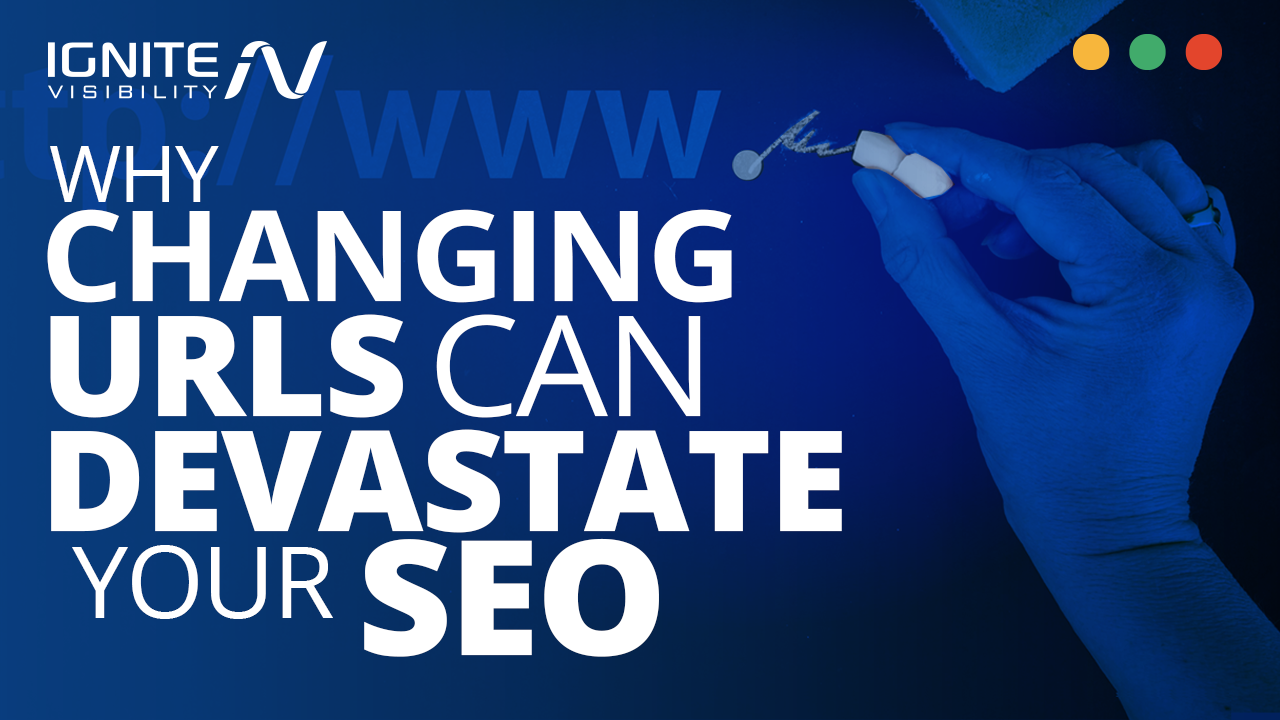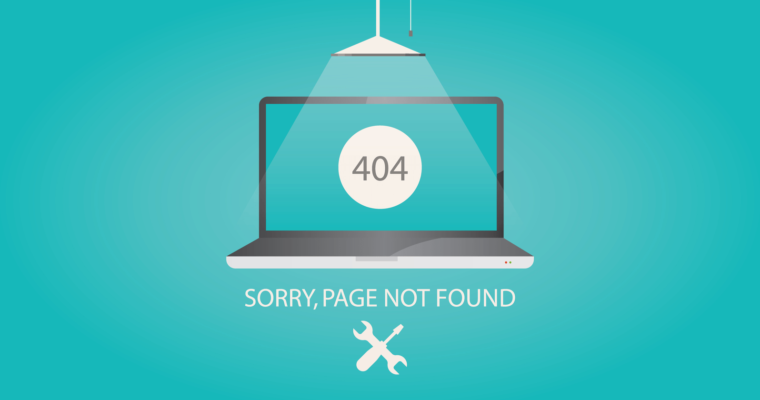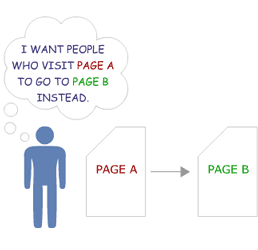Seo Impact Of Changing Url
Does changing a URL affect the SEO performance of a website?
The short answer is yes.
In fact, for years, digital marketing experts have cautioned businesses against changing their site URLs for the sake of boosting their SEO rankings.
When doing so incorrectly, changing your URL will undo all your SEO work, triggering your website to plummet in ranking and search traffic. If you're considering changing your URL, beware.

What You'll Learn:
- How changing URLs can affect your SEO ranking
- How changing URLs can affect referring traffic
- If you do decide to change URLs:
- Only use 301 redirects
- Check your URLs with tools
The impact of changing URLs on your SEO can be severe.
Doing so makes your site susceptible to 404 errors and broken links, which means it's nearly impossible for Google to properly index your site.
Before making changes to any URL, there are some very important factors you need to consider.
Why Change URLs?
There are a few reasons to consider moving your website to another URL.
The most common one involves structure changes during a rebranding effort, site migration, or design overhaul. In this case, defining elements like domain name, product types, or platform changes no longer permits you to maintain the same URLs.
Other reasons for changing a URL include:
- New company name
- Developing a new website
- Damage to your domain reputation or security concerns
- Point people from a fixed location, like your Facebook account, to your latest blog post.
- Take an old link that pointed at a previously held event and now point it at a current event.
- To point a user to a more appropriate piece of content.
- To update a bad or dead link.
When Should I Change URLs?
The honest and most common answer to this question is to simply avoid making changes to your URLs unless you have an extremely good reason to do so.
In that case, if you've said "yes" to any of the reasons for changing a URL above, then your next question is probably, "when should I change URLs?"
But before you jump the gun in deciding, it is important that you understand the risks associated with potentially losing all link equity and traffic to those URLs.
Google's John Mueller has explained that when too many URLs are changed, it can take Google a lot of time to reprocess and rediscover them, especially if they are not at the root level. This results in significant drops in rankings and undetermined recovery time.
If you're absolutely certain that making a change to your URL structure is necessary for your website or platform, then it would be wise to perform a full site audit so that any loss and drops in rankings can be monitored.
In the next sections, I'll explore the risks associated with changing URLs.
Loss of SEO Ranking
Simple changes to your URL, such as changing domain, adding or removing punctuation, or adjusting capitalization in your directory can have serious implications on your SEO.
When moving to a new domain, you need to understand the new domain's history. If the history includes penalties or spam, you're going to experience a serious drop in traffic. Plus, you run the risk of duplicate content and messy redirects.
No matter the reason for wanting to change a URL, it will likely result in a drop in traffic while Google indexes the changes, even when performed correctly.
However, if errors are made, the loss will be significant and difficult to overcome. When any URL is changed, your organic search performance is going to change, which can be for the worse.
Loss of Referring Site Traffic
Hopefully, you've built a healthy link portfolio with plenty of referring site traffic.
But, if you plan to move your site or change your website URL, you put yourself at risk of losing the referring traffic that you've worked so hard to build.
There's a reason why inbound links from older domains are more valuable than newer ones. Older sites tend to have greater link equity, as the chances of having accrued links from other trusted websites are much higher.
However, redirect lead to slower page load speeds and don't pass any SEO equity to the target pages.
In fact, if any link to a target URL fails to be properly redirected, it gets reported as a lost link.
For most URL changes, particularly not at the root level, it can take some time for Google to rediscover all those URLs.
Google ranks a site largely based on the links pointing to and from it, and changing URLs may cause the referring links to lead website visitors to error pages. These broken links are going to hurt your referring traffic and your site's domain authority.
Email Clicks Go to Dead URLs
Making a change to the URL doesn't only hurt your rank, but can negatively impact your email marketing campaigns.
Email subscribers may click on a link that sends them to a dead URL. Without the proper redirects, broken links will flood your subscribers' inboxes, causing your email clicks and subscriber base to drop.
This also increases the risk of your email reputation being compromised and your future campaigns ending up in spam filters.

Changing URLs could result in users clicking through to a 404 page
Deciding to Change URLs
Prior to making the choice to change a website's URL, you need to weigh your decision carefully.
URLs are the lifeblood of SEO. Even one broken link can wreak havoc on your website. You should only change URLs when it's 100% necessary. Ask yourself whether or not you're ready to experience an estimated 25% loss in your traffic while you wait for redirects to properly kick in.
You may think that a temporary drop in traffic will be better in the long run interms of SEO, but in 2013, Google's John Mueller stated that he doesn't recommend anyone change URLs for SEO reasons. Only change your URLs if it's necessary.
If you're going to do a significant overhaul of your entire website or move to a new site, it may make sense to change your URL. But only do so if you need to permanently redirect.
Dynamic and static URLs are a large contributing factor for many when making the choice.
Google admits that static URLs may have a slight advantage in terms of click-through rates, while dynamic URLs are favored over hiding parameters to make them look static.
Google has made progress in both areas and despite what many believe, dynamic URLs can be crawled by Google. Google recommendsavoiding rewriting dynamic URLs unless you're removing unnecessary parameters or parameters that can cause issues down the road.
If you are wondering how to change the URL of a website with as little friction as possible, there are a few steps you absolutely need to take.
Only Use 301 Redirects
Google recommends using 301 redirects if you need to change website URLs. Using a 301 redirect will prevent links or indexing errors.
A 301 redirect is appropriate if you want a seamless transition moving an old site to a new domain. They are also appropriate if you want people to be able to access your website through multiple URLs, or if you're doing a full site overall and want to merge websites while ensuring outdated URLs are redirected to the new website.

Always use 301 redirects if you do decide to change URLs. Image courtesy of MOz
Also, a small side note : Don't do a rel canonical from https to http and leave the https live , especially if your website doesn't work on https. That will be very bad for conversion rate optimization (CRO).
Before you begin, create a redirect strategy to preserve your site's traffic and link quality. This will help your new URL inherit the old URL's link authority, rather than having to earn it from scratch. It also allows the old links to be de-indexed over time.
Overall, a link strategy will minimize the amount of time your organic search will suffer before returning to normal. Plus, it will ensure all necessary steps have been taken to reduce any broken links or loss of referral traffic.
Check Your URLs
Before your work is done, you need to use tools to check for any errors to determine how your new links will perform.
Here are some of the top solutions on the market:
- Broken Link Checker: Arguably the most popular link checker of the bunch, you can add Broken Link Checker as a plugin to automatically check links. Once those broken links are detected, a report will be generated describing the reasoning behind the broken links.
- Screaming Frog SEO Spider: This web tool helps to view, analyze, and filter the crawl data as it is gathered. In addition to examining backlinks and internal and external links to improve your website's performance, their SEO Spider is a downloadable tool so you can run reporting directly from your desktop.
- SEMrush: Taking a unique approach, SEmrush's website crawler checks sites by deploying a deep link study and inspecting incoming links and anchor texts. It also offers geo-distribution resources like pie charts, grids, tables, and a world map.
These kinds of tools act as spiders that crawl your site and will analyze and audit your site for any missed redirects or duplicate page issues. That way, you're able to review and resolve any onsite issues that may hurt your SEO efforts before they become a problem.
Bottom Line
URLs and redirects are tedious and often misunderstood.
Changing URLs may seem like a good idea, but you need to consider how it will hurt or help your bottom line.
When considering site redesigns and platform changes, fully evaluate the risks and benefits involved, and how URL structural changes will affect SEO. Don't take the decision lightly.
When you're mapping your changes, remember:
- Only use 301 redirects with a URL to URL redirect for every page you're going to keep.
- Update all on-page links to accommodate the change, avoiding chain redirects.
- Create a new XML sitemap and submit it to Google.
- If you're moving an old site to a new site, leave the old site map up temporarily.
- Check your work with an SEO spider tool.
Seo Impact Of Changing Url
Source: https://ignitevisibility.com/why-changing-urls-can-devastate-seo-traffic/
Posted by: simmonsshavinicaut.blogspot.com

0 Response to "Seo Impact Of Changing Url"
Post a Comment